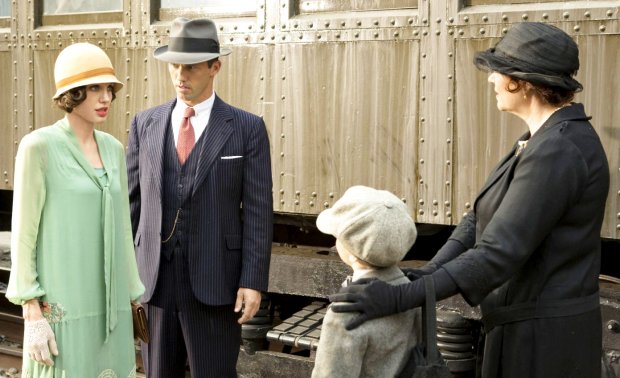← Back to Reviews
in
Changeling (Clint Eastwood, 2008) +

Los Angeles, 1928. The young son of single mother Christine Collins (Angelina Jolie) disappears one day while she's at work, and after months of hope and suffering, LAPD Captain Jones (Jeffrey Donovan) tells her that he's found her son and that he's coming to town by train. When Christine first sees the boy, she's sure that he is not her son, but in front of the Press and local authorities, she agrees to take him home. It soon becomes unbearable for Christine, so she complains again to Capt. Jones to find her real son, but Jones doesn't want to deal with it, and eventually goes so far as to have Christine unilaterally committed to a mental hospital for acting strangely. Christine does have a friend and advocate, Rev. Gustav Riegleb (John Malkovich), who's on a crusade against LAPD corruption, and he does his best to help her. Meanwhile, Detective Ybarra (Michael Kelly) investigates the case of a young illegal Canadian boy (Devon Conti) who may hold the key to Christine's son's fate.
Eastwood and his crew meticulously recreate Los Angeles of the period through spectacular sets, costumes, music, automobiles and streetcars. The photography during the outdoor daylight scenes is especially evocative, but much of the film is shot indoors or at night, and these scenes are all done in a very dark, noirish style which are the exact opposite of the bright, sunlit scenes. The plot is complex and splinters off into several directions, and there are quite a few climaxes, even when some of them are intercut. One of the film's minor flaws, at least to me, is that it is too long, but it keeps trying to bring some closure to the story, so I can understand why it's as long as it is. I liked all the acting, even if Changeling somewhat follows in a recent Eastwood pattern of painting the "bad guys" especially bad. What I find especially impressive is that Eastwood was able to make this film and Gran Torino back-to-back and have them be so different from each other. This film is a serious period drama based on a true story, while Torino, which seems more lighthearted, modest and offhand, is actually equally serious in its intentions.
Note: Clint Eastwood just became the second person to receive a lifetime Palme d'Or from the Cannes Film Festival. The only other person is Ingmar Bergman.

Los Angeles, 1928. The young son of single mother Christine Collins (Angelina Jolie) disappears one day while she's at work, and after months of hope and suffering, LAPD Captain Jones (Jeffrey Donovan) tells her that he's found her son and that he's coming to town by train. When Christine first sees the boy, she's sure that he is not her son, but in front of the Press and local authorities, she agrees to take him home. It soon becomes unbearable for Christine, so she complains again to Capt. Jones to find her real son, but Jones doesn't want to deal with it, and eventually goes so far as to have Christine unilaterally committed to a mental hospital for acting strangely. Christine does have a friend and advocate, Rev. Gustav Riegleb (John Malkovich), who's on a crusade against LAPD corruption, and he does his best to help her. Meanwhile, Detective Ybarra (Michael Kelly) investigates the case of a young illegal Canadian boy (Devon Conti) who may hold the key to Christine's son's fate.
Eastwood and his crew meticulously recreate Los Angeles of the period through spectacular sets, costumes, music, automobiles and streetcars. The photography during the outdoor daylight scenes is especially evocative, but much of the film is shot indoors or at night, and these scenes are all done in a very dark, noirish style which are the exact opposite of the bright, sunlit scenes. The plot is complex and splinters off into several directions, and there are quite a few climaxes, even when some of them are intercut. One of the film's minor flaws, at least to me, is that it is too long, but it keeps trying to bring some closure to the story, so I can understand why it's as long as it is. I liked all the acting, even if Changeling somewhat follows in a recent Eastwood pattern of painting the "bad guys" especially bad. What I find especially impressive is that Eastwood was able to make this film and Gran Torino back-to-back and have them be so different from each other. This film is a serious period drama based on a true story, while Torino, which seems more lighthearted, modest and offhand, is actually equally serious in its intentions.
Note: Clint Eastwood just became the second person to receive a lifetime Palme d'Or from the Cannes Film Festival. The only other person is Ingmar Bergman.
